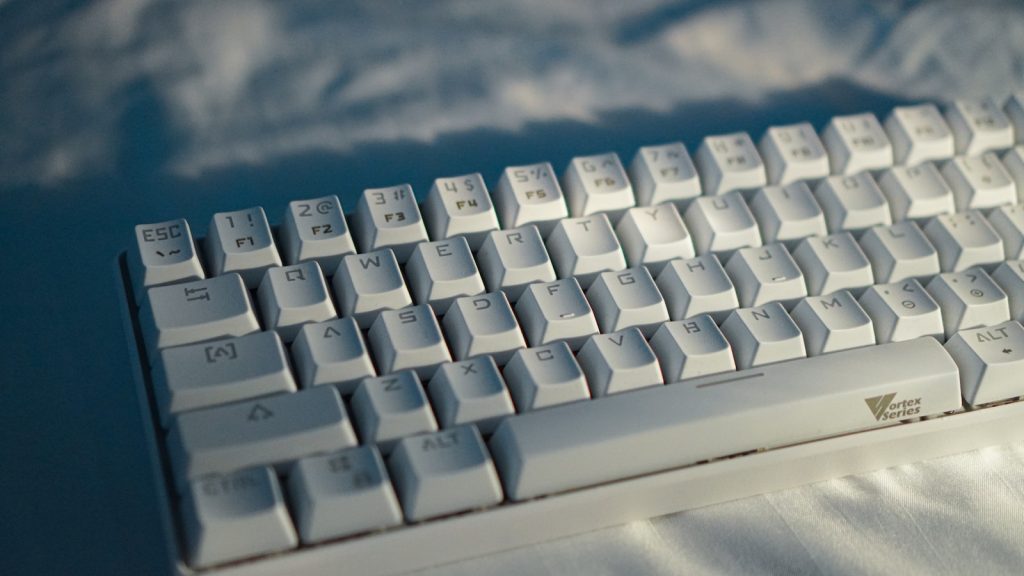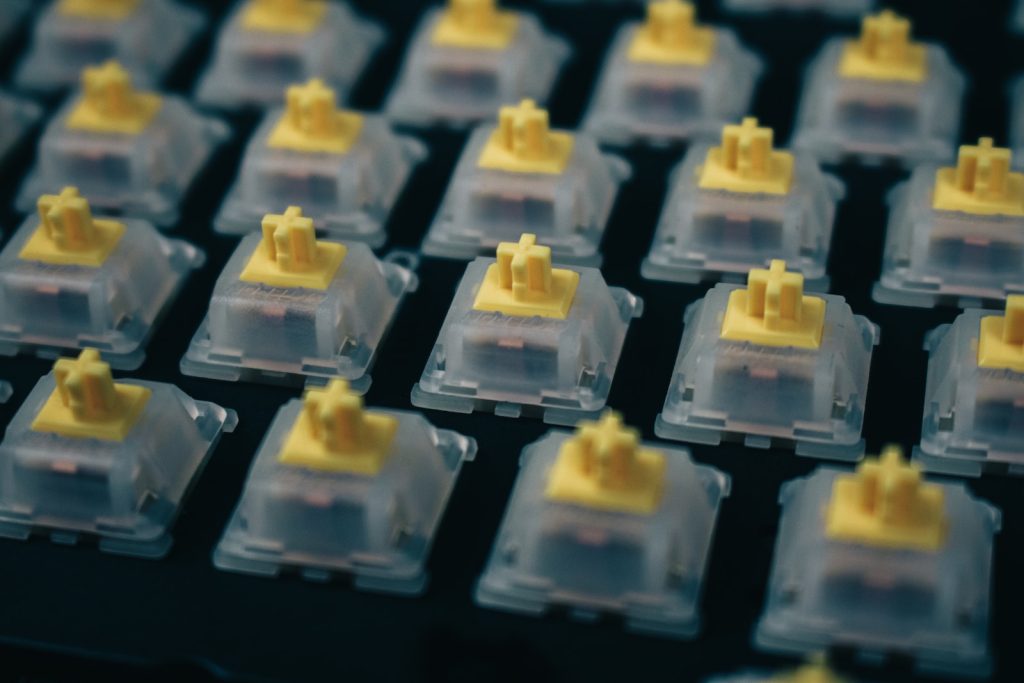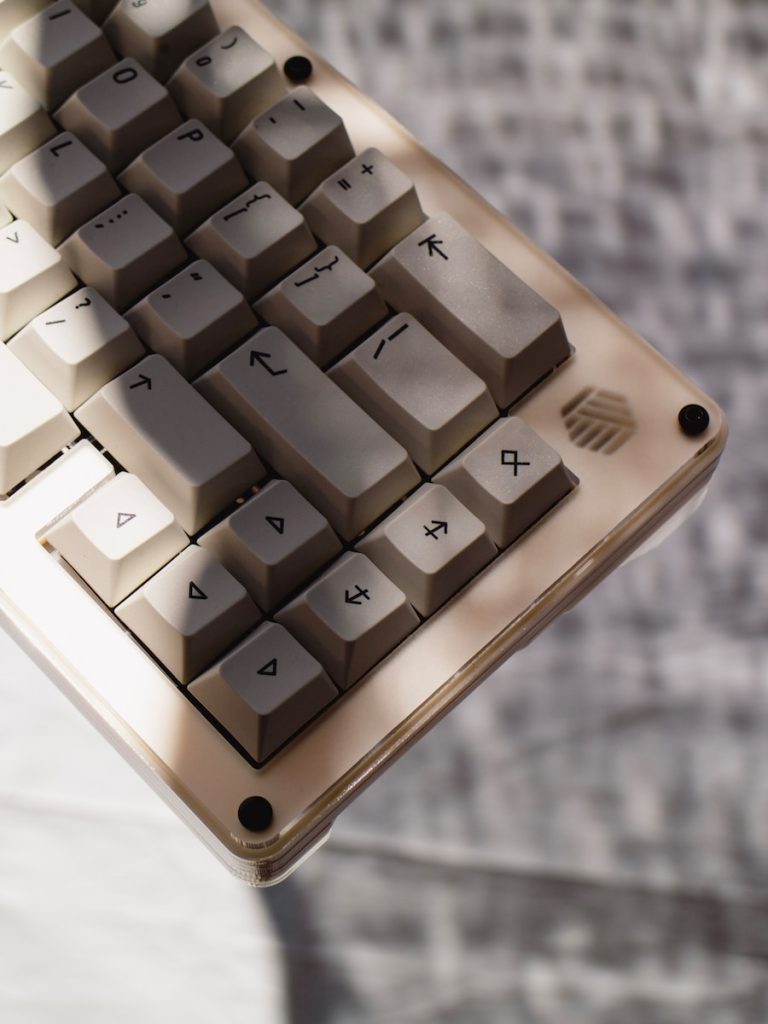When diving into the realm of mechanical keyboards, one of the most common questions is: Are mechanical keyboards loud? The answer isn’t straightforward, but let’s decode the sound and delve deeper into this auditory experience.

Mechanical vs. Membrane Keyboards Sound
Mechanical keyboards are known for their distinct sound, setting them apart from their membrane counterparts. But what causes this difference in auditory experience? Membrane keyboards operate using a pressure pad system, making them generally quieter. In contrast, the sound of a mechanical keyboard is influenced by various factors.
The Core of the Sound: Keyboard Switches
At the heart of every mechanical keyboard lie the switches beneath the keycaps. These switches are the primary contributors to the sound produced during typing. Depending on the switch type, the resulting sound can differ significantly.
Tactile vs. Linear Switches Noise
Mechanical switches are primarily categorized into tactile and linear types. Tactile switches, like the Cherry MX Blue, have a noticeable “bump” mid-press, resulting in a distinct sound. Linear switches, such as the Cherry MX Red, offer a continuous smooth press, leading to a less pronounced sound.
Keycaps’ Influence
Though switches are primary sound contributors, one shouldn’t overlook the role of keycaps. Different keycap materials can either amplify or muffle the resulting sound. PBT (Polybutylene Terephthalate) keycaps, being denser, might produce a more resonant sound. In contrast, ABS (Acrylonitrile Butadiene Styrene) keycaps might yield a crisper sound.
Sound Dampening Techniques
For users who appreciate the tactile feedback of mechanical keyboards but desire less noise, various sound dampening solutions exist. O-rings are a popular choice. These tiny rubber rings, placed on the switch stem, act as shock absorbers, minimizing the noise produced during key presses.
Silent Mechanical Keyboards
Recognizing the demand for quieter mechanical keyboards, manufacturers have introduced silent variants. These are equipped with switches designed to reduce noise, offering a blend of mechanical tactile feedback and reduced sound output.

Customizing Your Sound
One of the most significant advantages of mechanical keyboards is the customization aspect. Beyond aesthetics, users have the power to shape their keyboard’s auditory signature.
Switch Lubing: A Subtle Art
An emerging trend among mechanical keyboard enthusiasts is switch lubing. By carefully applying lubricant to the moving parts of a switch, users can not only alter the feel of their keystrokes but also reduce friction, leading to quieter keypresses.
Key Stabilizers: Beyond Individual Keys
Keys like the spacebar, enter, and shift are larger and can produce more noise, especially when pressed off-center. Stabilizers are used to ensure even key movement, but their quality can vary. Upgrading or lubing stabilizers can dramatically reduce rattling and result in a smoother, quieter keystroke.
Sound Profiles: Embracing Diversity
Every keyboard switch has its own sound profile. While Cherry MX switches are popular, many alternative brands, such as Gateron, ZealPC, and Topre, offer unique acoustic characteristics. Exploring different switches can lead to finding a sound profile that’s music to your ears.
Acoustic Pads: Dampening from Below
Another effective way to reduce keyboard noise is by using acoustic pads. Placed between the keyboard case and the PCB (Printed Circuit Board), these pads can absorb vibrations, leading to a solid and muted typing experience.
Evolving Keyboard Technologies
Innovation doesn’t stop. As the mechanical keyboard community grows, so does the demand for advanced features. Companies are continuously researching and developing new switches and materials aimed at optimizing both the tactile and auditory experience. With advancements like optical switches and magnetically actuated keys, who knows what the future holds?
Acoustics and Mechanical Keyboards
Understanding the sound of a mechanical keyboard isn’t just about the components; it’s also rooted in acoustics. The way sound waves travel and how they interact with surfaces can greatly affect our perception of loudness.
Desk Material: The Unsung Hero
The desk on which the keyboard sits plays a significant role in sound amplification. Wooden desks, for instance, tend to amplify sounds due to their resonant properties. On the other hand, a glass or metal surface might offer a different auditory experience. Using desk mats or pads can help in altering this dynamic, providing a buffer between the keyboard and the desk.
Keyboard Case: More Than Just Looks
The material and design of the keyboard case can influence sound significantly. A plastic case might produce a higher-pitched sound, while a metal or aluminum case could result in deeper, more resonant tones. Additionally, the case’s interior design, whether it’s hollow or solid, can either amplify or dampen the sound.
The Role of Ambient Environment
The surrounding environment also plays a part. A room with many soft furnishings, like carpets and curtains, will absorb sound, making a keyboard seem quieter. In contrast, a room with hard surfaces, like tiles and bare walls, might lead to sound reflections, making the keyboard sound louder.

Sound Testing: The Objective Measure
For those truly dedicated to understanding their keyboard’s sound, sound testing is an option. Using specialized equipment, one can measure the decibel levels produced by different key presses. This objective measure can help users make informed choices about modifications and sound dampening techniques.
Community Insights: Sharing and Learning
The mechanical keyboard community is vast and passionate. Forums, social media groups, and conventions offer platforms for enthusiasts to share their experiences, insights, and sound tests. Engaging with this community can provide valuable knowledge, tips, and tricks to optimize the auditory experience.
Conclusion
In decoding the sound of mechanical keyboards, various factors play pivotal roles, from the inherent design differences compared to membrane keyboards to the intricacies of switches, keycaps, and personal customizations. The auditory experience can be influenced by tactile vs. linear switches, keycap materials, sound dampening techniques, and even the desk or room acoustics.
With a vast community supporting and driving innovations, mechanical keyboards offer a spectrum of sound profiles to suit every preference. Whether seeking the iconic click or a muted press, understanding these elements ensures an optimized typing experience, making each keystroke a tailored auditory event.
FAQs
Why are mechanical keyboards louder than other types?
Mechanical keyboards use physical switches beneath each key, leading to the characteristic ‘click’ or ‘clack’ sound. The type of switch, combined with other factors like keycap material and keyboard construction, can influence the loudness.
Do all mechanical keyboards produce the same sound?
No, the sound varies based on the type of switch (e.g., tactile vs. linear), keycap material, and any modifications like dampening techniques or lubing. Different brands and models can have distinct sound profiles.
Is there a way to reduce the noise of a mechanical keyboard?
Yes, there are several methods, including using O-rings, lubing the switches, upgrading stabilizers, and using acoustic pads. Silent mechanical keyboards, specifically designed to minimize noise, are also available.
How does the surface or desk material affect the sound of a mechanical keyboard?
The material of the desk can amplify or muffle the keyboard’s sound. For instance, wooden desks may intensify the noise due to their resonant properties, while desk mats or pads can help dampen it.
Are there communities or forums where I can learn more about mechanical keyboard sounds?
Absolutely! The mechanical keyboard community is vast, with forums, social media groups, and conventions where enthusiasts share experiences, sound tests, and insights, helping newcomers and veterans alike optimize their auditory experience.

Experience is what matters at the end!!
Hi! This is Jacob Jay – founder of Keyboardgear.com! From childhood to adulthood, I’ve always remained passionate about IT, and the revolution in this industry, especially gaming on the PC can’t go out of my way. Since I’m an enthusiastic gamer, and I love to experience various gaming accessories, particularly mechanical keyboards, that really boost my gaming adventure manifolds. So, my nerve cells hit me to transfer my experiences into word form and share with others to identify the ideal keyboards perfectly fit for their gaming modes.
I know very well how hard it is to find the high-quality items available on the internet that ought to be exactly the same as seen as on the screen. But the counterfeiters have ruined the user’s trust. As I have passed all such situations, I’m obliged to deliver the genuinity and express the same as what I am saying.
So, now, I’m working on the mission to provide very helpful and frankly but trustworthy reviews and guides about various mechanical keyboards, mouses, and other gaming accessories as per my personal experiences and sound knowledge.
